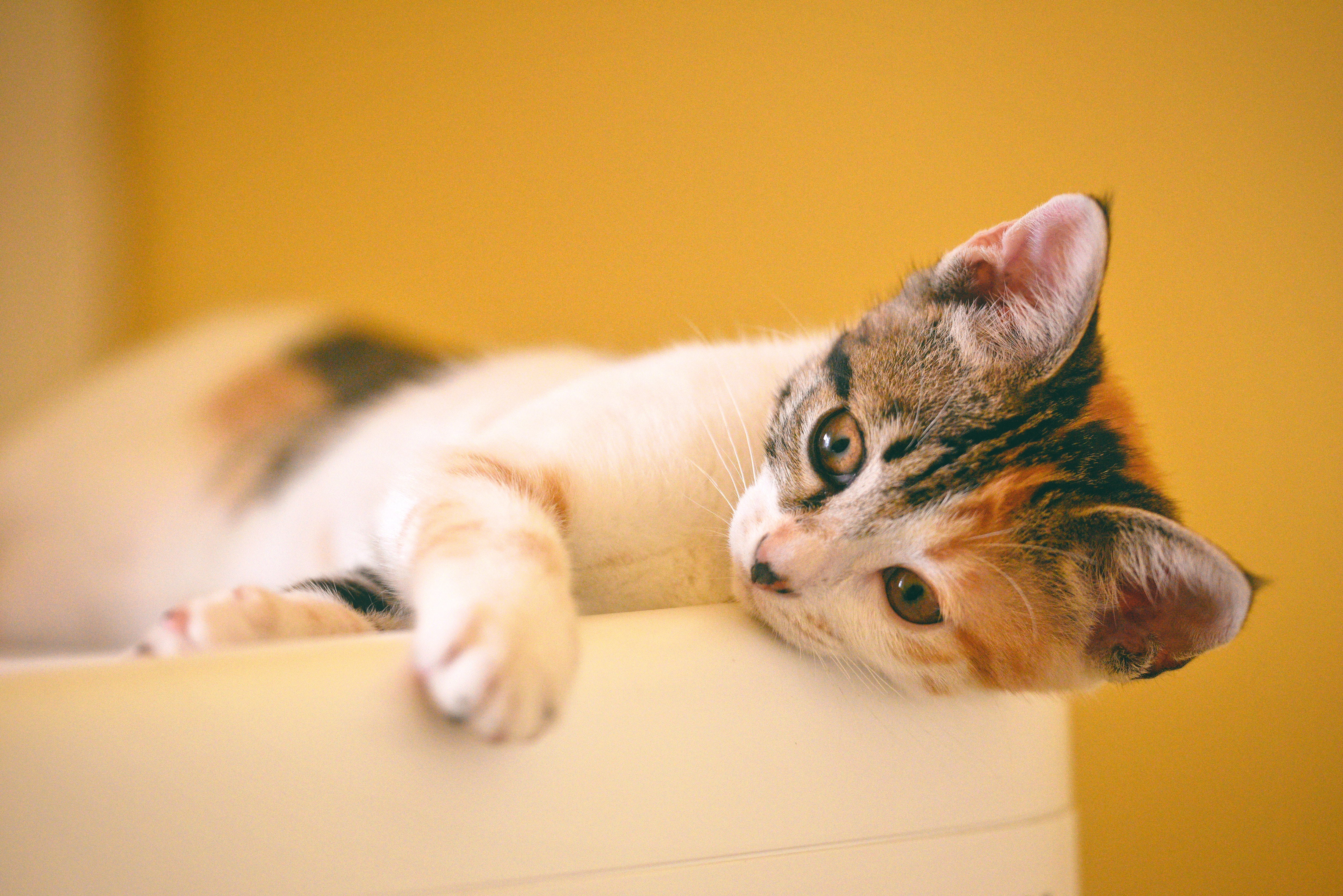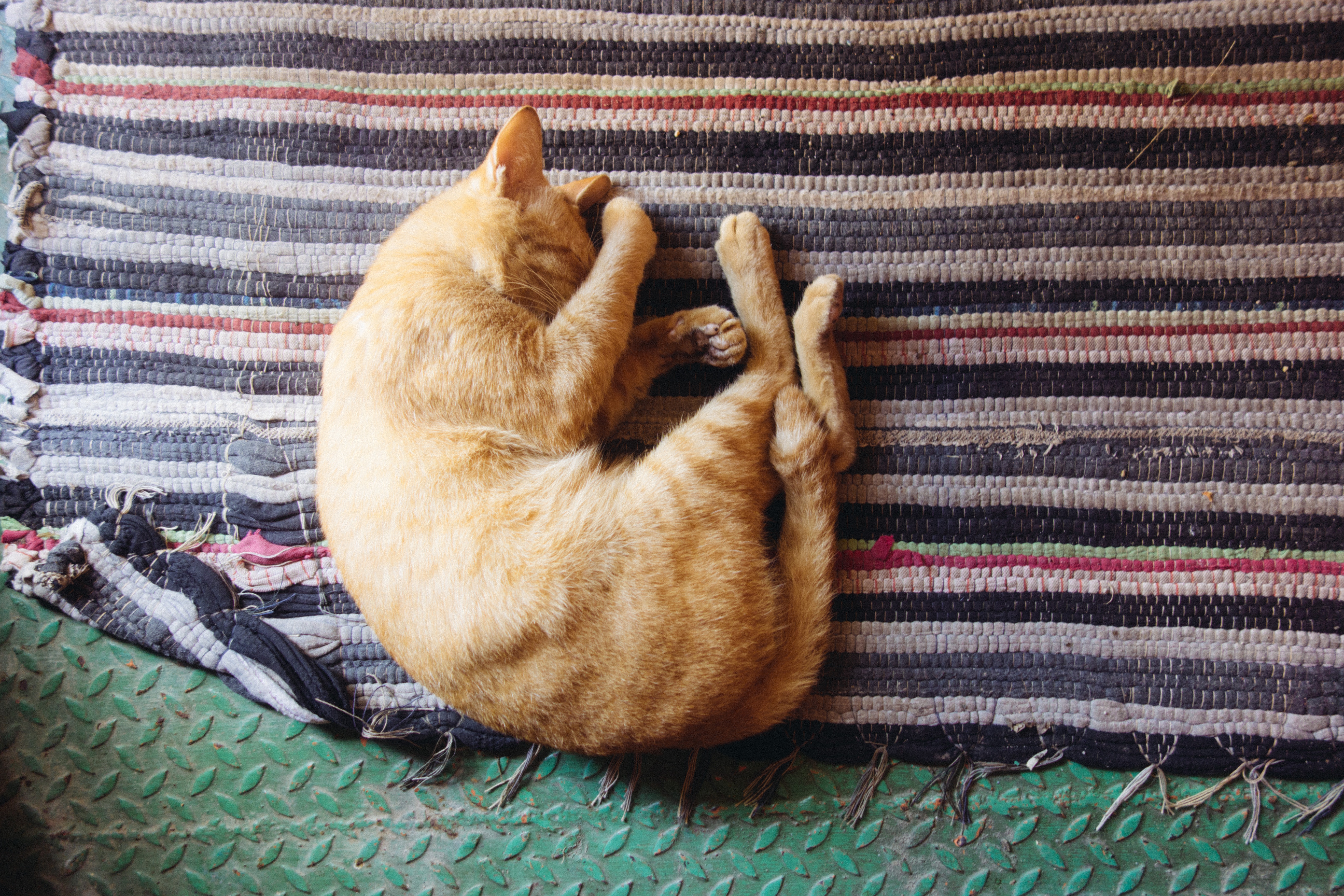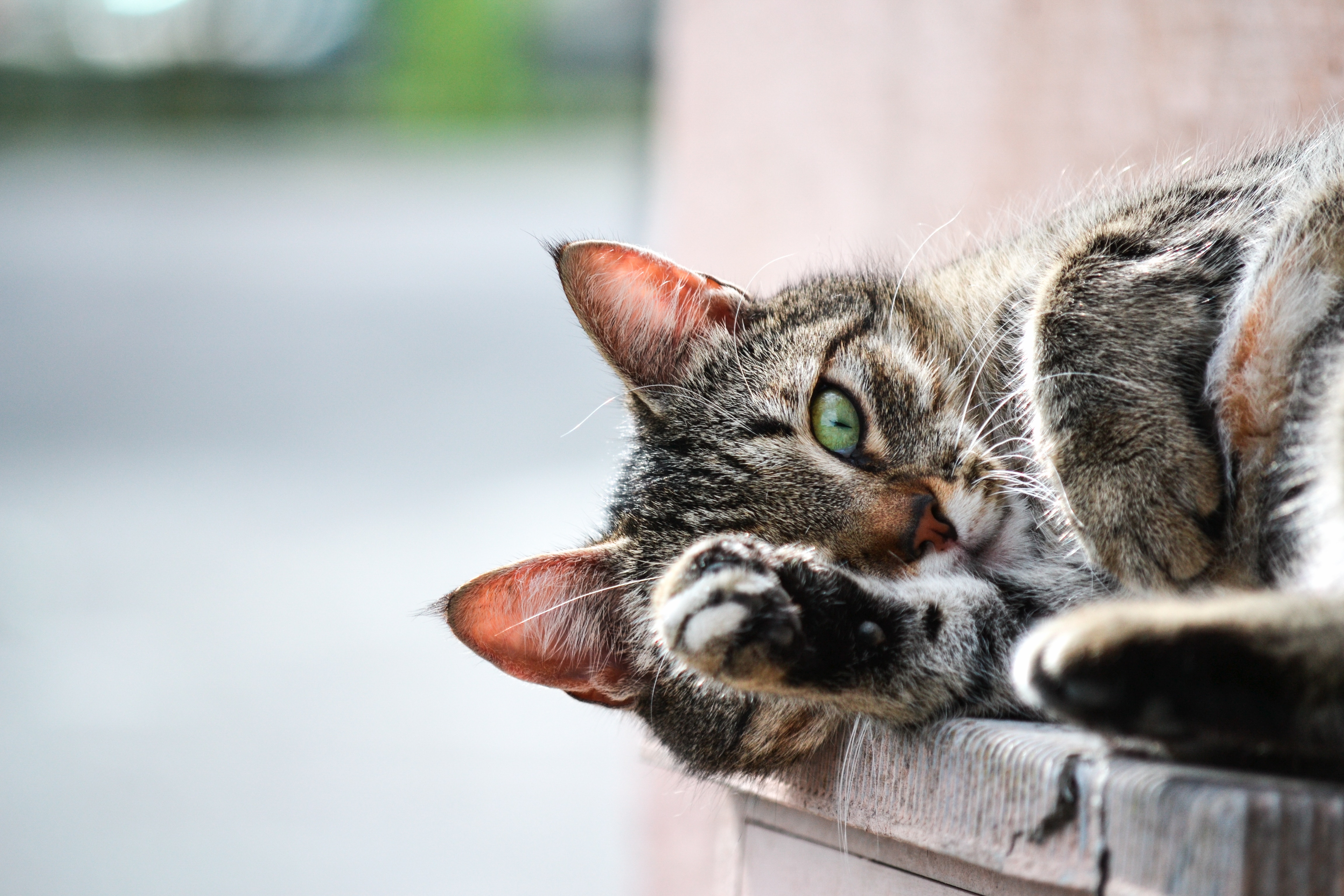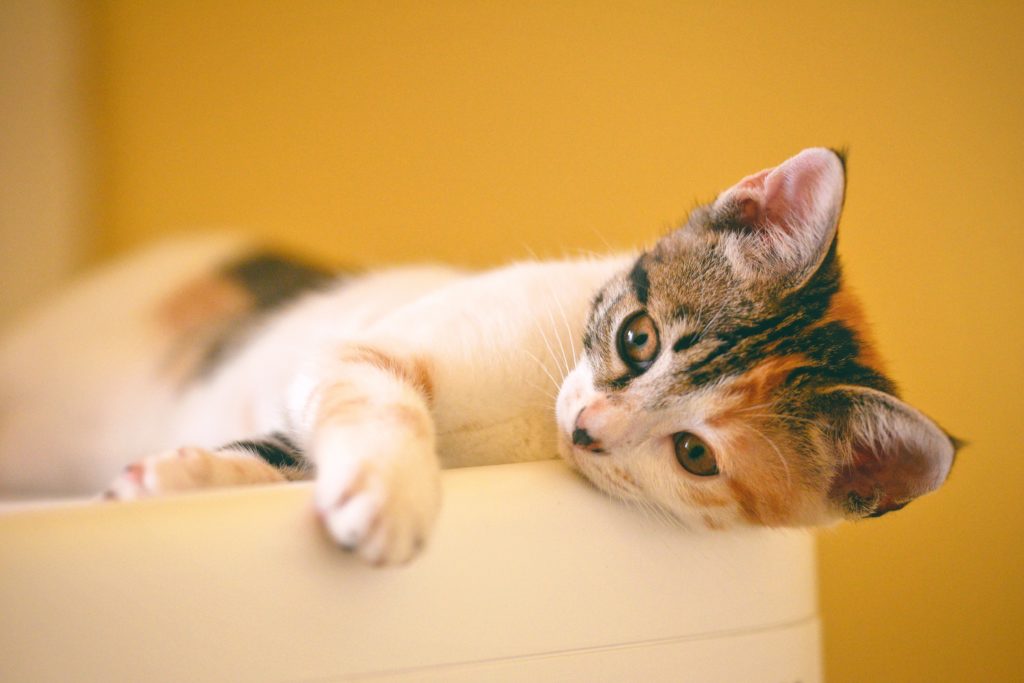Many cat owners worry about their cat getting fat, but very few realize that a cat losing weight is just as serious of a problem. Unintentional weight loss can be a sign of an underlying medical issue that needs to be addressed.
If your cat is losing weight, you may not immediately notice because weight loss often happens at a slow pace. It’s even more difficult to tell if you have a long-haired cat, since their coat may hide the fact that he’s slimming down.
There are a few ways to tell if your cat is losing weight, regardless of his breed. As you pet, play, and groom him, notice if he feels bonier or if his stomach tuck (the area between his ribs and hind legs) seems to be more exaggerated. If he seems to be lighter when you pick him up or he jumps on your lap, that’s another indicator that he’s lost some weight. Paying attention to your cat’s eating habits and behaviors can also help you identify if there is a potential weight problem developing.
Keep in mind, if your 10-pound cat loses even just one pound, that’s 10 percent of his body weight—and a cause for concern. Severe weight loss in cats can affect many of their body’s systems and lead to more serious problems down the road.
Causes of Weight Loss in Cats
 Ultimately, weight loss is due to insufficient calorie intake, but there are many factors that can cause this to happen. Reasons for cat weight loss can range from serious conditions to something as simple as picky eating habits in pets. If your cat is losing weight and you’re not sure why, it could be for one of these reasons.
Ultimately, weight loss is due to insufficient calorie intake, but there are many factors that can cause this to happen. Reasons for cat weight loss can range from serious conditions to something as simple as picky eating habits in pets. If your cat is losing weight and you’re not sure why, it could be for one of these reasons.
Anorexia
If your cat has a complete lack of appetite, it can be because of anorexia. This condition is extremely dangerous to cats. It can lead to feline hepatic lipidosis, or fatty-liver disease, which develops when the liver has to process large amounts of stored fat in order to provide energy to the body.
Cancer
Cancer is a relatively common cause of a cat losing weight. Gastrointestinal lymphoma, which is associated with feline leukemia virus (FeLV), can result in a cat’s refusal to eat as well as a rough coat and lethargy. The cancer cells found in tumors, even those that are benign, can consume the energy and calories a cat gets from his food, robbing him of nutrients and sometimes causing muscle atrophy. Cats with cancer may also lose their appetite because of pain caused by the disease.
Diabetes
Diabetes in cats is caused by a failure to produce the hormone insulin or an impaired ability to respond to it. If your cat’s appetite seems to be insatiable, then it could be because the disease is prohibiting him from properly processing and utilizing the calories he consumes, leaving him hungry despite not gaining any weight. Cats with diabetes will also have symptoms like lethargy, excessive urination, excessive thirst, dehydration, feline urinary tract infections, and sweet-smelling breath. If left untreated, diabetes can lead to impaired motor function, coma, and even death.
Food Quality & Taste
Cats are known to be finicky eaters. If your cat is uninterested in the type, brand, or taste of food in his bowl, he may just not eat. Some cats will go for days (even weeks) without eating if they don’t find their meal appetizing. Other factors that could affect how your cat perceives his food could be its proximity to the litter box, and whether it’s served in a clean dish bowl.
Gastrointestinal Problems
A cat losing weight could have a problem with his gastrointestinal tract. Gastrointestinal diseases can inhibit normal digestion and prevent an adequate absorption of nutrients, resulting in weight loss. If a GI issue is the cause of weight loss, you may notice other symptoms such as cat diarrhea, lack of appetite, feline nausea, and vomiting. Constipation can also cause weight loss; if you’re not seeing a usual number of deposits in the litter box, it could be because your cat is backed up and feeling uncomfortable, which could result in a loss of appetite. Common GI problems include inflammatory bowel disease, intestinal parasites, pancreatitis, feline food allergies, or certain infections.
Hyperthyroidism
If your cat is eating well, maybe even more than usual, but still losing weight, it may be due to hyperthyroidism. This happens when a benign hormone-producing tumor on the thyroid gland produces an excess amount of thyroid hormone. The increased levels of the thyroid hormone amps up the cat’s metabolic rate, which burns more calories throughout the day. Hyperthyroidism in cats has other symptoms beyond weight loss, including increased drinking, increased urination, increased activity, vomiting, diarrhea, and muscle atrophy. Older cats are more at risk for developing this condition.
Nasal Congestion
Scent is a primary appetite stimulant for cats. If a cat is congested—whether due to cat allergies or an infection—he will not be able to smell his food and he’ll have no desire to eat. If the congestion is not addressed, his appetite could suffer and weight loss will occur.
Oral Pain
Cats are usually pretty good at hiding their pain, but if you notice that your cat has suddenly stopped eating (which has caused him to lose weight), then a toothache, broken tooth, dental disease, gingivitis, mouth ulcers, resorptive lesions (“kitty cavities”), or some other type of oral pain could be the culprit. Eating can become very difficult or painful for a cat dealing with oral issues, especially if their diet consists of dry food. Besides weight loss, the other signs of tooth problems include bad breath, excessive drooling, decreased interest in food, reluctance to be touched around the mouth and face, pawing at the mouth, and eating differently (like only eating on one side or dropping food as he eats).
Parasitic Infections
Intestinal parasites and infections, or worms, can cause weight loss in cats. Intestinal worms survive by stealing the nutrition from the food a cat eats. A heavily infested cat can lose weight because he is not getting any of the nutrition from what he consumes, no matter how much he eats. If you notice that your cat is eating a lot, but still seems to be losing weight, this may be the reason. Other symptoms, although not always present, are diarrhea, bloating, vomiting, and difficulty breathing.
 Stress, Depression, & Anxiety
Stress, Depression, & Anxiety
Cats who are dealing with psychological stress may lose their appetite, resulting in weight loss. Some cats are more sensitive to environmental stressors than others. Stress is frequently caused by changes in their environment such as excessive noise, new family members (human or feline), changes in routine, competing for food, or the death of another pet.
Other causes of weight loss include various diseases and types of infections, including:
- Addison’s disease
- Central nervous system disorders
- Fever
- Infections (bacterial, fungal, or viral)
- Intestinal tumors
- Liver disease
- Neurological disorders
- Pregnancy or nursing
- Prolonged exposure to cold
- Protein-loss (due to injury or infections)
Older Cat Losing Weight
Weight loss in older cats is common; this is why many owners of senior cats dismiss the change as a sign of an aging metabolism. However, just like with younger cats, an older feline who is dropping pounds is more than likely suffering from an underlying disease or medical condition.
As a cat ages, it becomes more prone to developing diseases that can lead to weight loss. While these can occur in cats of any age, these are the conditions that are more prevalent in older cats.
Endocrine Disease
The most common endocrine diseases that affect senior cats are hyperthyroidism and diabetes. With both these disorders, felines often have an increased appetite but still continue to lose weight. A cat with hyperthyroidism will also show symptoms such as increased body temperature, sudden bursts of energy, frequent vomiting, and sudden weight loss due to a higher metabolism from the excess thyroid hormones. Diabetes prevents sugar from penetrating the bloodstream, which means cats cannot process the calories, fats, and nutrients they eat; as a result, cats with diabetes will lose weight no matter how much they eat.
Gastrointestinal Lymphoma
One of the most common types of GI diseases found in older cats is GI lymphoma, an incurable form of cancer. Cats with this disease will show symptoms of lethargy and lack of appetite. It’s also linked to inflammatory bowel disease (IBD), which can lead to food sensitivities, chronic diarrhea, vomiting, and compromised immune function.
Heart Disease
Heart disease in cats occurs as a result of damage to the heart’s structure over time. Cardiomyopathy is the most common type of heart disease in cats; it accounts for nearly two-thirds of diagnosed conditions. With cardiomyopathy, the left ventricle becomes thickened (due to dilation or scarring), and interferes with the heart’s ability to pump blood. The condition can sometimes lead to secondary diseases like anemia and hyperthyroidism, which can cause weight loss in cats.
Kidney Disease
More than half of older cats suffer from chronic kidney disease (CKD). This is because the kidneys gradually deteriorate as cats age. CKD can cause weight loss and a diminished appetite; other symptoms include increased thirst, increased urination, diarrhea, depression, anemia, and vomiting.
Organ Failure
Senior cats can lose weight because of organ failure or disfunction. For example, as the kidney stops working, it can lead to decreased appetite, vomiting, and increased urination, which all result in weight loss.
Respiratory Disease
Respiratory tract infections, chronic sinusitis, and other respiratory diseases can all interfere with a cat’s ability to smell, and thereby decrease his appetite. Feline asthma, and tumors on the lungs, which are also common conditions found in older cats, can result in lethargy, difficulty breathing, and weight loss.
It’s especially important for senior cats to be seen by their vet if they’re losing weight unintentionally or rapidly, or showing other signs of illness. To keep your elderly cat as healthy as possible, make sure he has regular check-ups with his vet throughout the year.
When to See a Vet
 If you notice that your cat is losing weight, it’s important to consult with your vet as soon as possible. Waiting to see if he gets back to a healthy, fuller weight can be extremely detrimental to his health; the underlying medical condition that is causing your cat to lose weight could have been going on for a long time by the time weight loss becomes evident.
If you notice that your cat is losing weight, it’s important to consult with your vet as soon as possible. Waiting to see if he gets back to a healthy, fuller weight can be extremely detrimental to his health; the underlying medical condition that is causing your cat to lose weight could have been going on for a long time by the time weight loss becomes evident.
Your vet will be able to help you determine what your cat’s ideal weight should be. In some cases, if your cat was overweight to begin with, the weight loss might be a welcomed change.
When you take your cat to the vet, they will weigh your cat and complete a thorough physical exam to determine what the cause of your cat’s weight loss may be. The physical exam will often include blood work and a urinalysis. These tests are designed to check organ function and eventually establish a potential reason for why your cat is losing weight.
If a cause cannot be determined based on those tests, your vet may opt for an abdominal ultrasound, laparotomy (exploratory surgery), x-rays, or a biochemical blood panel to provide additional insight.
Once a cause has been discovered, your vet will be able to provide guidelines to fulfill your cat’s nutritional needs and help get him back up to a healthy weight.
Treatment
Treatment for cat weight loss is dependent on the underlying issue. Luckily, weight loss is easily treatable, even in senior cats.
Weight loss caused by gastrointestinal issues, like inflammatory bowel disease, that prevent food absorption, can be treated by introducing easily digested foods to your cat’s diet. If allergies are the culprit behind your cat’s weight loss, removing the irritant from his environment or diet will usually fix the problem and bring your cat’s appetite back to normal.
As long as you follow your vet’s treatment recommendations, your cat should recover without any issues. However, if your cat’s condition doesn’t quickly improve or he doesn’t respond to treatments, a follow-up appointment with your vet is needed.
Sources:
“Weight Loss and Chronic Disease in Cats.” PetMD, www.petmd.com/cat/conditions/digestive/c_ct_Weight_Loss_and_Cachexia.
“Unexplained, Sudden Weight Loss in Cats.” WebMD, www.pets.webmd.com/cats/weight-loss-in-cats.
“Is Your Older Pet Losing Weight? This May Be Why.” Mercola.com, healthypets.mercola.com/sites/healthypets/archive/2016/11/08/older-cat-weight.aspx.




